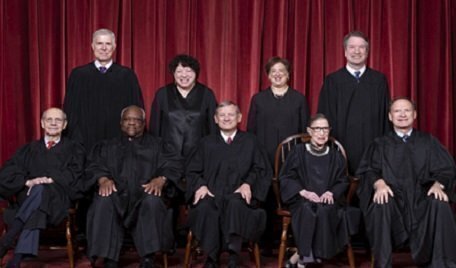The Supreme Court released four opinions on Tuesday morning, including a decision on an abortion case, and took important actions on two other widely followed cases.
 In a per-curiam or unsigned opinion, the Justices ruled on Box v. Planned Parenthood of Indiana and Kentucky, the abortion case, without hearing arguments. The state of Indiana had argued that the Seventh Circuit Court of Appeals incorrectly struck down two parts of a state abortion law. One provision required fetal remains to be buried or cremated; the other provision allowed the state to “prohibit the knowing provision of sex-, race-, and disability-selective abortions by abortion providers.”
In a per-curiam or unsigned opinion, the Justices ruled on Box v. Planned Parenthood of Indiana and Kentucky, the abortion case, without hearing arguments. The state of Indiana had argued that the Seventh Circuit Court of Appeals incorrectly struck down two parts of a state abortion law. One provision required fetal remains to be buried or cremated; the other provision allowed the state to “prohibit the knowing provision of sex-, race-, and disability-selective abortions by abortion providers.”
The Supreme Court accepted review on and reversed the federal appeals court ruling on the disposition of fetal remains, upholding the state law under “rational basis” review. But the Court denied review of Indiana’s appeal of the federal appeals court ruling that struck down bans based on abortion solely on the basis of sex, race, or disability. The Justices cited the lack of other federal appeals court rulings on the matter in declining to intervene. Justice Clarence Thomas wrote a concurring opinion, while Justice Ruth Bader Ginsburg concurred and dissented in part.
Among the three other opinions was a decision in Nieves v. Bartlett, where the Justices held by a 6-3 vote that Alaska state troopers had probable cause to arrest a man they confronted at a public event, and so the man could not pursue a First Amendment retaliatory arrest as a matter of law.
The Supreme Court also accepted a case for arguments that it had previously considered, Hernandez v. Mesa, about the ability of the family of a Mexican teenager to sue a U.S. Border Patrol agent. The Mexican teen was shot and killed while standing on Mexico's territory by the patrol agent on the United States side of the border in El Paso, Texas. In the current case, the Justices will now consider if the agent can be sued under the “Bivens” precedent. In a 1971 ruling in Bivens v. Six Unknown Named Agents, the Court said that under certain circumstances federal officers could be sued for damages on Fourth Amendment grounds if they violated a person’s clearly established constitutional rights while on duty.
The Court also denied review for Doe v. Boyertown Area School District, a case about transgender bathroom access at public schools. The Third Circuit Court of Appeals had denied a lawsuit brought by six students, represented by the Alliance Defending Freedom, who objected to sharing bathrooms and locker rooms with transgender students on privacy grounds. The students’ attorneys wanted the Supreme Court to rule on the Third Circuit’s use of strict scrutiny, the highest standard of legal review, in evaluating their claims. Boyertown school officials had also argued that it had provided multi-user and single-user bathroom to address privacy concerns. By denying review, the Court left open the transgender bathroom rights issue for another day.
Scott Bomboy is editor in chief of the National Constitution Center.







